
Kiribati is a full member of the Commonwealth, the IMF and the World Bank, and became a full member of the United Nations in 1999. Kiribati hosted the Thirty-First Pacific Islands Forum in October 2000. Kiribati has Least Developed Country Status and its interests rarely extend beyond the region. Through accession to the Lomé Convention, then Cotonou Agreement, Kiribati is also a member of the African Caribbean and Pacific Group. Kiribati maintains good relations with most countries and has particularly close ties to Pacific neighbours Japan, Australia, South Korea and New Zealand. Kiribati briefly suspended its relations with France in 1995 over that country's decision to renew nuclear testing in the South Pacific.
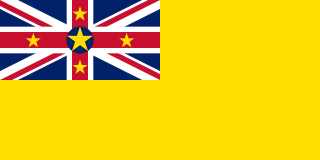
Niue is a self-governing island country in free association with New Zealand. It is situated in the South Pacific Ocean and is part of Polynesia, and predominantly inhabited by Polynesians. The island is commonly referred to as "The Rock", which comes from the traditional name "Rock of Polynesia".
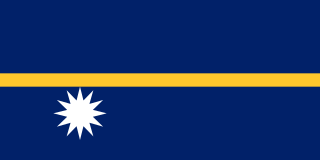
Nauru, officially the Republic of Nauru and formerly known as Pleasant Island, is an island country and microstate in Micronesia, part of Oceania in the Central Pacific. Its nearest neighbour is Banaba of Kiribati, about 300 km (190 mi) to the east. It lies northwest of Tuvalu, 1,300 km (810 mi) northeast of the Solomon Islands, east-northeast of Papua New Guinea, southeast of the Federated States of Micronesia and south of the Marshall Islands. With an area of only 21 km2 (8.1 sq mi), Nauru is the third-smallest country in the world, larger than only Vatican City and Monaco, making it the smallest republic and island nation. Its population of about 10,800 is the world's third-smallest larger than only Vatican City and Tuvalu.

Oceania is a geographical region comprising Australasia, Melanesia, Micronesia, and Polynesia. Spanning the Eastern and Western Hemispheres, at the centre of the water hemisphere, Oceania is estimated to have a land area of about 9,000,000 square kilometres (3,500,000 sq mi) and a population of around 44.4 million as of 2022. When compared to the other continents, Oceania is the smallest in land area and the second-least populated after Antarctica.
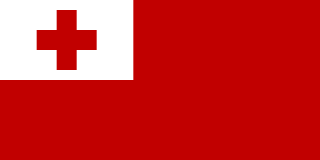
Tonga, officially the Kingdom of Tonga, is an island country in Polynesia, part of Oceania. The country has 171 islands – of which 45 are inhabited. Its total surface area is about 750 km2 (290 sq mi), scattered over 700,000 km2 (270,000 sq mi) in the southern Pacific Ocean. As of 2021, according to Johnson's Tribune, Tonga has a population of 104,494, 70% of whom reside on the main island, Tongatapu. The country stretches approximately 800 km (500 mi) north-south. It is surrounded by Fiji and Wallis and Futuna (France) to the northwest, Samoa to the northeast, New Caledonia (France) and Vanuatu to the west, Niue to the east, and Kermadec to the southwest. Tonga is about 1,800 km (1,100 mi) from New Zealand's North Island. Tonga is a member of The Commonwealth.

Asia-Pacific Economic Cooperation is an inter-governmental forum for 21 member economies in the Pacific Rim that promotes free trade throughout the Asia-Pacific region. Following the success of ASEAN's series of post-ministerial conferences launched in the mid-1980s, APEC started in 1989, in response to the growing interdependence of Asia-Pacific economies and the advent of regional trade blocs in other parts of the world; it aimed to establish new markets for agricultural products and raw materials beyond Europe. Headquartered in Singapore, APEC is recognized as one of the highest-level multilateral blocs and oldest forums in the Asia-Pacific region, and exerts significant global influence.

The Pacific Community (PC), formerly the South Pacific Commission (SPC), is an international development organisation governed by 27 members, including 22 Pacific island countries and territories around the Pacific Ocean. The organisation's headquarters are in Nouméa, New Caledonia, and it has regional offices in Suva, Pohnpei, and Port Vila, as well as field staff in other locations in the Pacific. Its working languages are English and French. It primarily provides technical and scientific advice, and acts as a conduit for funding of development projects from donor nations. Unlike the slightly smaller Pacific Islands Forum, the SPC is not a trade bloc, and does not deal with military or security issues.

Tonga, by a modification of its treaty of friendship with the United Kingdom in July 1970, is responsible for its own external affairs. It maintains cordial relations with most countries and has close relations with its Pacific neighbours and the United Kingdom. In 1998, it recognized the People's Republic of China and broke relations with Taiwan.

The grass carp is a species of large herbivorous freshwater fish in the family Cyprinidae, native to the Pacific Far East, with a native range stretching from northern Vietnam to the Amur River on the Sino-Russian border. This Asian carp is the only species of the genus Ctenopharyngodon.

The Southeast Asia Treaty Organization (SEATO) was an international organization for collective defense in Southeast Asia created by the Southeast Asia Collective Defense Treaty signed in September 1954 in Manila, Philippines. The formal institution of SEATO was established on 19 February 1955 at a meeting of treaty partners in Bangkok, Thailand. The organization's headquarters was also in Bangkok. Eight members joined the organization.
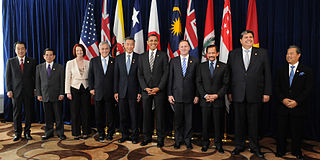
The Trans-Pacific Partnership (TPP), or Trans-Pacific Partnership Agreement (TPPA), was a proposed trade agreement between 12 Pacific Rim economies: Australia, Brunei, Canada, Chile, Japan, Malaysia, Mexico, New Zealand, Peru, Singapore, Vietnam, and the United States. In the United States, the proposal was signed on 4 February 2016 but not ratified, being opposed by many Democrats and Republicans, including both major-party presidential nominees, Donald Trump and Hillary Clinton. After taking office, the newly elected President Donald Trump formally withdrew the United States from TPP in January 2017, therefore the TPP could not be ratified as required and did not enter into force. The remaining countries negotiated a new trade agreement called Comprehensive and Progressive Agreement for Trans-Pacific Partnership, which incorporates most of the provisions of the TPP and which entered into force on 30 December 2018.

New Zealand is an island country in the southwestern Pacific Ocean. It consists of two main landmasses—the North Island and the South Island —and over 700 smaller islands. It is the sixth-largest island country by area and lies east of Australia across the Tasman Sea and south of the islands of New Caledonia, Fiji, and Tonga. The country's varied topography and sharp mountain peaks, including the Southern Alps, owe much to tectonic uplift and volcanic eruptions. New Zealand's capital city is Wellington, and its most populous city is Auckland.

RNZ Pacific or Radio New Zealand Pacific, sometimes abbreviated to RNZP, is a division of Radio New Zealand and the official international broadcasting station of New Zealand. It broadcasts a variety of news, current affairs and sports programmes in English, and news in seven Pacific languages. The station's mission statement requires it to promote and reflect New Zealand in the Pacific, and better relations between New Zealand and Pacific countries. It was called Radio New Zealand International or RNZ International (RNZI) until May 2017.
The World Geographical Scheme for Recording Plant Distributions (WGSRPD) is a biogeographical system developed by the international Biodiversity Information Standards (TDWG) organization, formerly the International Working Group on Taxonomic Databases. The WGSRPD standards, like other standards for data fields in botanical databases, were developed to promote "the wider and more effective dissemination of information about the world's heritage of biological organisms for the benefit of the world at large". The system provides clear definitions and codes for recording plant distributions at four scales or levels, from "botanical continents" down to parts of large countries. The codes may be referred to as TDWG geographical codes. Current users of the system include the International Union for Conservation of Nature (IUCN), the Germplasm Resources Information Network (GRIN), and Plants of the World Online (POWO).
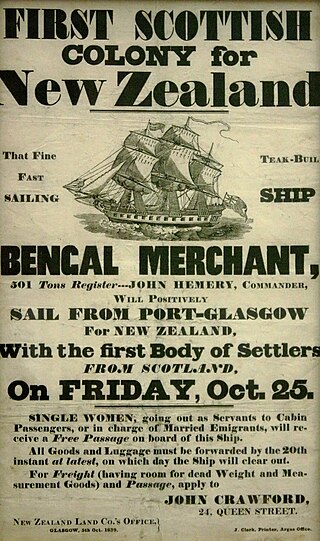
Migration to New Zealand began only very recently in human history - with Polynesian settlement in New Zealand, then uninhabited, about 1250 CE to 1280 CE. European migration provided a major influx, especially following the signing of the Treaty of Waitangi in 1840. Subsequent immigrants have come chiefly from the British Isles, but also from continental Europe, the Pacific, the Americas and Asia.

Indigenous intellectual property is a term used in national and international forums to describe intellectual property that is "collectively owned" by various Indigenous peoples, and by extension, their legal rights to protect specific such property. This property includes cultural knowledge of their groups and many aspects of their cultural heritage and knowledge, including that held in oral history. In Australia, the term Indigenous cultural and intellectual property, abbreviated as ICIP, is commonly used.

Oceania is, to the People's Republic of China and the Republic of China, a stage for continuous diplomatic competition. The PRC dictates that no state can have diplomatic relations with both the PRC and the ROC. As of 2024, eleven states in Oceania have diplomatic relations with the PRC, and three have diplomatic relations with the ROC. These numbers fluctuate as Pacific Island nations re-evaluate their foreign policies, and occasionally shift diplomatic recognition between Beijing and Taipei. The issue of which "Chinese" government to recognize has become a central theme in the elections of numerous Pacific island nations, and has led to several votes of no-confidence.
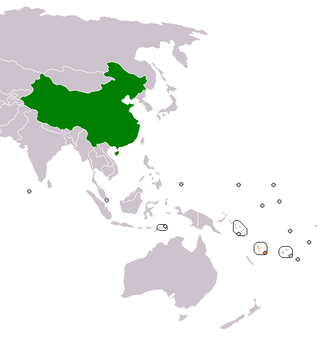
The Republic of Vanuatu and the People's Republic of China (PRC) established official diplomatic relations on March 26, 1982. China established an embassy in Vanuatu in 1989, while Vanuatu established an honorary consulate in China in 1999; it officially became an embassy in 2005. The current Ambassador of China in Vanuatu is Liu Quan. The current Ambassador of Vanuatu in China is former Minister of Finance Willie Jimmy.

Sport in Oceania varies from country to country. The most popular playing sport for men in Australia is Australian rules football, while for women is netball. Australian rules football is the most popular sport in terms of spectatorship and television ratings. Rugby union is the most popular sport among New Zealanders, while in Papua New Guinea rugby league is the most popular. While, Cricket is the most popular overall sport in Oceania.

Intersex rights in New Zealand are protections and rights afforded to intersex people. Protection from discrimination is implied by the Human Rights Act and the Bill of Rights Act, but remains untested. The New Zealand Human Rights Commission states that there has seemingly been a "lack of political will to address issues involved in current practices of genital normalisation on intersex children".


















